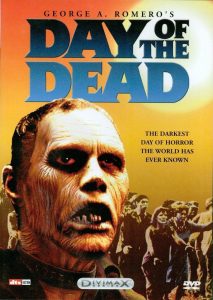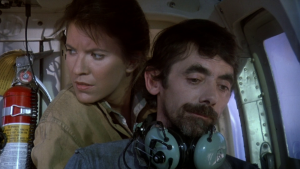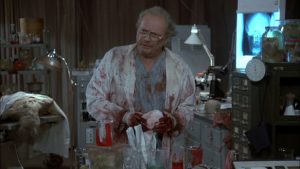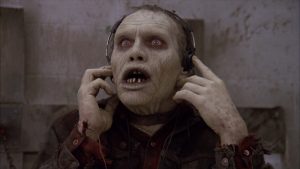Zombie Reviews . . . Day of the Dead

Zombie Reviews . . . Day of the Dead
by A. Zombie
Rated: Not Rated (Contains extreme violence, strong adult language)
Language: English
Starring: Lori Cardille, Terry Alexander, Joseph Pilato, Richard Liberty, Jarlath Conroy, and Sherman Howard
In tribute to the man who brought us all to this weird zombie life, I snagged Day of the Dead for a re-watch . . . and realized I’d never covered the film for this website. Well, that’s just wrong. We’re going to remedy the problem right now.
 Sarah and her band of scientists are perhaps the last to continue research work during the zombie apocalypse. They’re aided by thuggish army personnel who’ve just about had their limit of hunkering down in an abandoned missile silo while the man they call Frankenstein carries out gruesome experiments. The team’s goal is to find any way to lessen the zombie impact in an earth overrun by the undead. Sarah wants a cure. Her blood-coated coworker, Dr. Logan, thinks he can tame zombies using positive reinforcement and their own latent human traits. It works. Somewhat. There’s one zombie who’s not like the others: Bub. But their progress with Bub isn’t enough for Rhodes, the military man in charge. He snaps and all their hard work hits the fan.
Sarah and her band of scientists are perhaps the last to continue research work during the zombie apocalypse. They’re aided by thuggish army personnel who’ve just about had their limit of hunkering down in an abandoned missile silo while the man they call Frankenstein carries out gruesome experiments. The team’s goal is to find any way to lessen the zombie impact in an earth overrun by the undead. Sarah wants a cure. Her blood-coated coworker, Dr. Logan, thinks he can tame zombies using positive reinforcement and their own latent human traits. It works. Somewhat. There’s one zombie who’s not like the others: Bub. But their progress with Bub isn’t enough for Rhodes, the military man in charge. He snaps and all their hard work hits the fan.
Now, admittedly, Day of the Dead isn’t many people’s favorite Dead film. The language is beyond foul. The racism makes any sane person’s blood boil. The way the men treat the only woman is abhorrent, and while there’s no sexual violence, it sure is threatened a lot. We’re meant to be disgusted by these men. The best shortcut was to make them outrageously racist, misogynistic, and flat out a-holes of the highest caliber. They’ve existed in an echo chamber of hatred while stuck underground. Basically, this is Romero saying that if you put a bunch of awful white men in a jar, they’ll become even more hateful before turning on each other just to have someone to fight other than their own thoughts. Unfortunately, they weren’t alone and those caught in the crossfire are people who don’t deserve to be treated so badly. Almost everyone pays with their lives because Rhodes is, deep down, a frightened little boy who requires a death grip on everything he can possibly control since the world above is absolutely insane.
 The ethical questions raised by Dr. Logan’s experiments lead to some of the best conversations Romero’s ever brought to the table, on-screen and off. At what point do the undead stop being human? For Logan, it is never, ever clear. He has no qualms about using the military men as fresh zombies to operate on while he searches for what makes them tick. On the other hand, he treats Bub as an adoptive son, is painfully patient with him, and goes to great lengths to ensure the zombie’s well-being. This is night and day compared to the way Logan talks to the scientific team and the military men. With humans he speaks from a place of deep entitlement, never bothering to hide that he believes himself to be far superior to them because he’s so dang smart. He gets away with it, for the most part. However when Sarah snaps and puts Rhodes or his men in their place, she’s nearly shot. Logan made himself important, far more important than his peer, and forced Rhodes to see her as disposable. Frankenstein was never in the silo to help humanity. He was there to help himself by gathering knowledge about the one thing no one else had access to, and did it in a way he knew Sarah wouldn’t replicate so she could never be on the pedestal he built for himself.
The ethical questions raised by Dr. Logan’s experiments lead to some of the best conversations Romero’s ever brought to the table, on-screen and off. At what point do the undead stop being human? For Logan, it is never, ever clear. He has no qualms about using the military men as fresh zombies to operate on while he searches for what makes them tick. On the other hand, he treats Bub as an adoptive son, is painfully patient with him, and goes to great lengths to ensure the zombie’s well-being. This is night and day compared to the way Logan talks to the scientific team and the military men. With humans he speaks from a place of deep entitlement, never bothering to hide that he believes himself to be far superior to them because he’s so dang smart. He gets away with it, for the most part. However when Sarah snaps and puts Rhodes or his men in their place, she’s nearly shot. Logan made himself important, far more important than his peer, and forced Rhodes to see her as disposable. Frankenstein was never in the silo to help humanity. He was there to help himself by gathering knowledge about the one thing no one else had access to, and did it in a way he knew Sarah wouldn’t replicate so she could never be on the pedestal he built for himself.
There’s so much going on with the dead in this film. This is where Romero drove home the notion that they’re not much different from us, only they have something primal driving them instead of the complex rules humans live by every day. They’ve got more freedom than the humans. Even Bub and the others imprisoned in the silo for experimentation are at liberty to do what they want because there’s no social rules for the undead. Their only restriction is placed on them by another species. They just are whoever they are and nothing can change that. Bub already possessed the reasoning capabilities Logan exploits in the film. How do we know that? Land of the Dead. In that film, the dead communicate, have returned to a human-less life where they repeat the tasks ingrained in their minds from their living days, and eventually band together to seek something which is missing from their lives. If Bub were taught how to reason, future generations of zombies wouldn’t have been able to accomplish their great trek to Fiddler’s Green. We owe a lot to Bub.
 The makeup FX are some of the best . . . for 1985. Except for a few background actors in full masks who accidentally shuffled too close to camera, the zombies are a collection of what everyone considers a stereotypical zombie. Go look at your local zombie pub crawl. Most of what’s there can also be found in the final act of Day of the Dead. There’s even a clown, for heaven’s sake. Romero did it all back in a decade when zombies weren’t the cool thing to produce. That influence echoes throughout anything dealing with the undead to this day.
The makeup FX are some of the best . . . for 1985. Except for a few background actors in full masks who accidentally shuffled too close to camera, the zombies are a collection of what everyone considers a stereotypical zombie. Go look at your local zombie pub crawl. Most of what’s there can also be found in the final act of Day of the Dead. There’s even a clown, for heaven’s sake. Romero did it all back in a decade when zombies weren’t the cool thing to produce. That influence echoes throughout anything dealing with the undead to this day.
Day of the Dead signaled a change in the way the undead would be presented for decades. For that reason, and so many more, I’m giving it four oozing eyeballs out of five.
